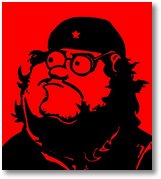
I wrote a high school paper about the world-famous Ernesto “Che” Guevara and I remember being more than a little confused as to why he was revered by the left, particularly many actors and musicians of which I was a fan, as such a superhero. As I was a long-banged, Smiths-listening lefty by association (young, dumb and full of… Morrissey) I tended to side with my similarly spoon-fed friends and decided I dug the guy – although in my own defense I never, ever, owned one of those fucking Che shirts. Guevara was either a complete bastard or God’s gift simply depending on which book I was able to sign out of the CCHS library on a given day. The rift, split and division continues to this day, but as far as the influence of popular culture and Hollywood is concerned, el Commandante definitely has a leg up – which is both irresponsible and unfortunate. I’ll explain.
“Knowing what we know, why do we still celebrate him?” – Paul Berman
In the years since my compass has drifted, thankfully, farther to the right. That having been said, I was still excited to devote 4 hours of my life to watching Steven Soderbergh’s Che – and I did so, in one sitting, late Monday night. I certainly enjoyed the movie as entertainment. It felt authentic, gritty, was action-packed and engaging all the way through the Cuban revolution, his operations in the Congo (which are only briefly mentioned by another character and almost wholly omitted from the film) and to the final battles in the Bolivian jungle. To the uninitiated this film’s protagonist would definitely appear to be a revolutionary hero. The movie’s slant is in no way conflicted on this point.
Killer Chic: Hollywood’s Sick Love Affair With Che Guevara
From the above video: It’s something that baffles Cuban jazz legend Paquito D’Rivera. “Che hated artists, so how is it possible that artists still today support the image of Che Guevara?” Turns out the rebellious icon that emblazons countless T-shirts actually enforced aesthetic and political conformity.
My problem with the film has nothing to do with acting, timeline, 85% Spanish dialogue, cinematography or any other technical or aesthetic aspect. It’s solid celluloid. I will never, however, recommend it to anyone under the age of 25 who’ve never read at least a couple of books/articles on the man, preferably one from each side of the aisle. If “Che” Parts 1 and 2 are the only point of reference for a young mind, which they will undoubtedly become once the DVDs are released later this year, you’d think the guy was a cross between Dr. Quinn Medicine Woman and Davey Crockett.
 A large percentage of Cubans remember him as the “the butcher of La Cabaña” and he is considered by many others to be the genesis of continuing politically-charged brutality in the regions he directly influenced – and many that he did not. Fischer Price: My First Revolution, if you will. As Del Toro’s Che tells Lou Diamond Phillip’s character, “A coup without an army behind it never stands a chance“. Lou Diamond, fresh on the heels of his tour-de-force performance on the George Lopez Show, nods stoically. I have to be honest here though – I think there are 12-yr-old white girls in Northern Minnesota who know they have a better chance of spotting a Yeti than seeing a revolution without violence. Then they get to college and some unkempt 3rd-year activist convinces them otherwise, signs them up for a candlelit vigil during which he tries to finger her and then buys her a Che shirt the next morning as an apology. Does anyone else see the irony in that?
A large percentage of Cubans remember him as the “the butcher of La Cabaña” and he is considered by many others to be the genesis of continuing politically-charged brutality in the regions he directly influenced – and many that he did not. Fischer Price: My First Revolution, if you will. As Del Toro’s Che tells Lou Diamond Phillip’s character, “A coup without an army behind it never stands a chance“. Lou Diamond, fresh on the heels of his tour-de-force performance on the George Lopez Show, nods stoically. I have to be honest here though – I think there are 12-yr-old white girls in Northern Minnesota who know they have a better chance of spotting a Yeti than seeing a revolution without violence. Then they get to college and some unkempt 3rd-year activist convinces them otherwise, signs them up for a candlelit vigil during which he tries to finger her and then buys her a Che shirt the next morning as an apology. Does anyone else see the irony in that?
The leanings of Soderbergh and his Hollywood pals are no secret, but there’s “spin” and then there’s blatant omission. Stevey can argue that he does indeed show Che ordering executions. Two of his own troops who deserted, raped and then torched the house of peasants are shot during the first half of the film. (So what you’re saying is that many of his victims deserved to be blown away in jungle clearings. I get it now, and I still love you and your t-shirt, Johnny Depp!). He can also point out that during once scene, shortly before he is dispatched, one of the Bolivian soldiers remarks, “Guevera assasinated my Uncle”. As far as ticks in the “definitely not any kind of hero” column, those calculated, punch-pulling critical additions to the film are just the tip of the firing squad.
 About a year ago I was at an Irish pub in Ottawa, Ontario and watched a group of about 30 twenty-somethings, obviously on some sort of bar crawl, stumble through the door all at once. To my dismay I noticed that they were all wearing identical neon-green t-shirts with the infamous Che visage boldly printed on the front. To prove a point to my companions, I told them I’d pay the tab for the entire night if just one of the misguided students pressed against our table like sardines could both a) identify and correctly pronounce the name of the man on their spiffy new shirt and b) tell me why they admired him. I made my point after speaking to about five of them and drank for free into the wee hours.
About a year ago I was at an Irish pub in Ottawa, Ontario and watched a group of about 30 twenty-somethings, obviously on some sort of bar crawl, stumble through the door all at once. To my dismay I noticed that they were all wearing identical neon-green t-shirts with the infamous Che visage boldly printed on the front. To prove a point to my companions, I told them I’d pay the tab for the entire night if just one of the misguided students pressed against our table like sardines could both a) identify and correctly pronounce the name of the man on their spiffy new shirt and b) tell me why they admired him. I made my point after speaking to about five of them and drank for free into the wee hours.
I’m no expert on the man, but I’ve definitely gone further out of my way over the last 20 years to be able to form an honest, objective opinion of his deserved legacy than the vast majority of my peers – a desire based in large on my early exposure to a book on the Cuban Revolution which my parents had in their house. I’ll shut up now. Spend the money you’re thinking of laying down for one of these incredibly inappropriate (you now know that Che vehemently disliked artists and musicians) t-shirt, dog tag or knit hat symbols of your progressiveness and spend it instead on a book like The Che Guevara Myth and the Future of Liberty – then see if you still feel the same way. That’s all I’m saying. Viva le Gordita !
